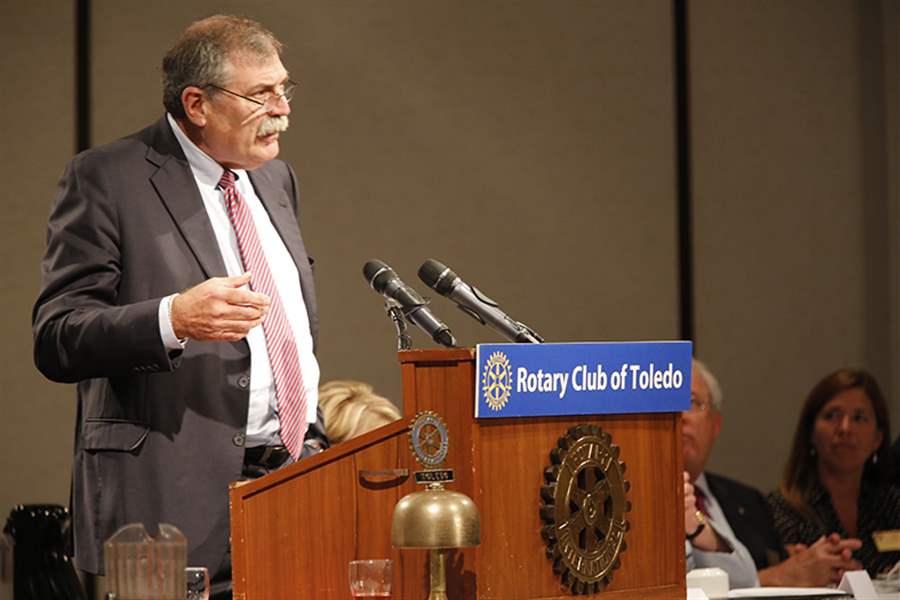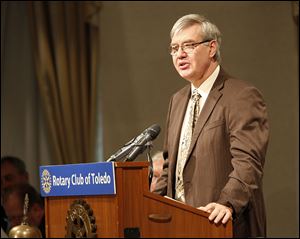
State places emphasis on early literacy skills
Dropouts follow ‘pathway to poverty’
8/26/2014
Richard Ross, Ohio superintendent of public instruction, left, and John Carey, chancellor with the Ohio Board of Regents, address members of the Rotary Club of Toledo during their meeting Monday in the Park Inn hotel downtown.
THE BLADE/JETTA FRASER
Buy This Image

Richard Ross, Ohio superintendent of public instruction, left, and John Carey, chancellor with the Ohio Board of Regents, address members of the Rotary Club of Toledo during their meeting Monday in the Park Inn hotel downtown.
Better educational success rates, both by reducing high school dropouts and improving outcomes in higher education, is the goal for Gov. John Kasich, a pair of the top state education officials told the Toledo Rotary Club on Monday.
School Superintendent Richard Ross and Ohio Board of Regents Chancellor John Carey said at the meeting in the downtown Park Inn hotel that they are focused on stronger collaboration between the Board of Regents and the Ohio Department of Education.
Mr. Ross pointed to the state’s stubbornly high dropout rate and attributed much of it to students who are promoted in school despite subpar performance.
“We know that’s a pathway to poverty,” he said.
Students who are socially promoted, Mr. Ross argues, end up overwhelmed and assume that school is not for them. He’s championed the state’s new Third Grade Reading Guarantee, which forces students who can’t score above a certain level to be kept in third grade.
Research shows holding back young children might be detrimental. But Mr. Ross said Monday that third grade reading scores rose significantly in the past year, and he attributed it to the reading guarantee. The rule has forced schools and students to focus on early literacy skills, he said.
The state has also increased options for career tech, expanding it to middle school grades, which gives students another pathway toward success, he said.
When asked about his commitment to the Common Core state standards, which faces criticism from conservatives and dismantling from Ohio Republican legislators, Mr. Ross didn’t specifically endorse the Common Core, but did say he supported higher standards.
Mr. Ross also faced questions about school funding and a reliance on property taxes in Ohio. He said higher expectations are more important than more funding for schools, though did point to an increase in school funding in the past state budget.

CTY education26p Ohio Board of Regents chancellor John Carey. Ohio state superintendent of Public Instruction Richard A. Ross and Ohio Board of Regents chancellor John Carey speak at the Rotary Club of Toledo meeting on August 25, 2014. The Blade/Jetta Fraser
“I do not believe that money is the driver in [improving achievement],” he said.
While K-12 schools are focused on dropout rates, higher education is battling its own dropout problem. The state’s response has been to shift funding away from enrollment and toward course and degree completion rates, Mr. Carey said.
And just like the education departments expansion of career tech, the Board of Regents is also looking for nontraditional education options, including work force development, experiential learning options, and college credit for high school students.
“The idea is to give students options and to give guidance with the decisions they make,” he said.
That doesn’t mean that universities should cut the humanities or sciences, he said, and the state is also committed to research at higher education institutions.
Contact Nolan Rosenkrans at: nrosenkrans@theblade.com or 419-724-6086, or on Twitter @NolanRosenkrans.